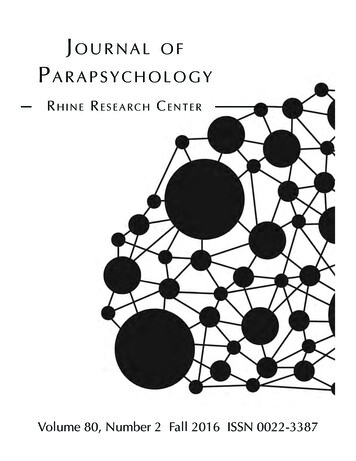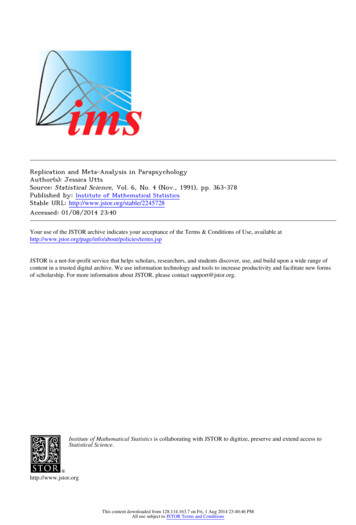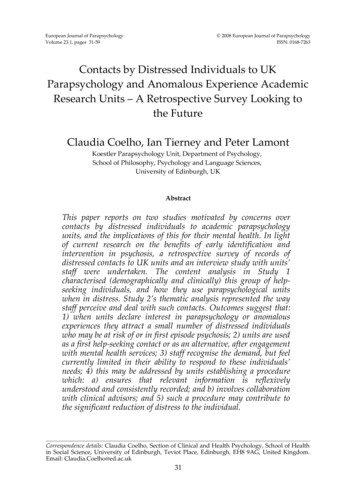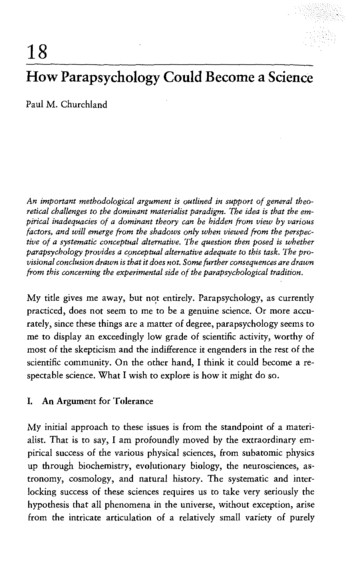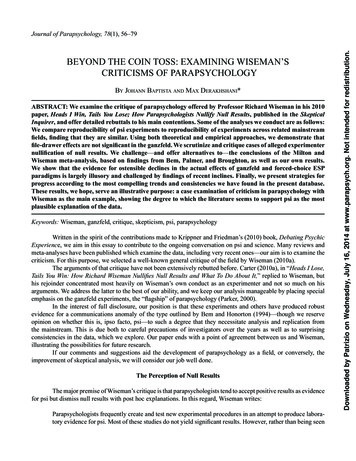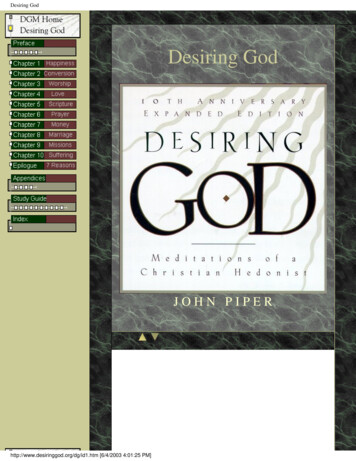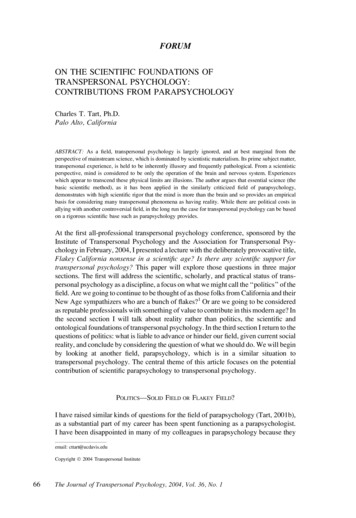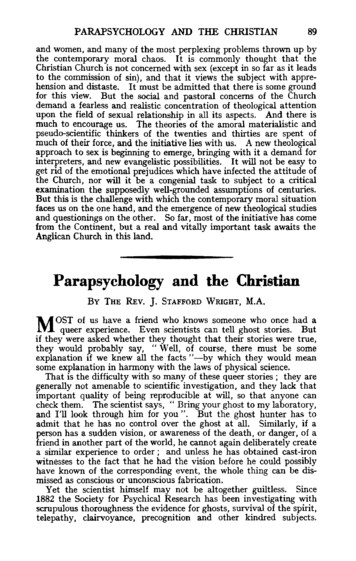
Transcription
PARAPSYCHOLOGY AND THE CHRISTIAN89and women, and many of the most perplexing problems thrown up bythe contemporary moral chaos. It is commonly thought that theChristian Church is not concerned with sex (except in so far as it leadsto the commission of sin), and that it views the subject with apprehension and distaste. It must be admitted that there is some groundfor this view. But the social and pastoral concerns of the Churchdemand a fearless and realistic concentration of theological attentionupon the field of sexual relationship in all its aspects. And there ismuch to encourage us. The theories of the amoral materialistic andpseudo-scientific thinkers of the twenties and thirties are spent ofmuch of their force, and the initiative lies with us. A new theologicalapproach to sex is beginning to emerge, bringing with it a demand forinterpreters, and new evangelistic possibilities. It will not be easy toget rid of the emotional prejudices which have infected the attitude ofthe Church, nor will it be a congenial task to subject to a criticalexamination the supposedly well-grounded assumptions of centuries.But this is the challenge with which the contemporary moral situationfaces us on the one hand, and the emergence of new theological studiesand questionings on the other. So far, most of the initiative has comefrom the Continent, but a real and vitally important task awaits theAnglican Church in this land.Parapsychology and the ChristianBY THEREv.J.STAFFORD WRIGHT,M.A.OST of us have a friend who knows someone who once had aMqueer experience. Even scientists can tell ghost stories. Butthey were asked whether they thought that their stories were true,ifthey would probably say, "Well, of course, there must be someexplanation if we knew all the facts "-by which they would meansome explanation in harmony with the laws of physical science.That is the difficulty with so many of these queer stories ; they aregenerally not amenable to scientific investigation, and they lack thatimportant quality of being reproducible at will, so that anyone cancheck them. The scientist says, " Bring your ghost to my laboratory,and I'll look through him for you". But the ghost hunter has toadmit that he has no control over the ghost at all. Similarly, if aperson has a sudden vision, or awareness of the death, or danger, of afriend in another part of the world, he cannot again deliberately createa similar experience to order; and unless he has obtained cast-ironwitnesses to the fact that he had the vision before he could possiblyhave known of the corresponding event, the whole thing can be dismissed as conscious or unconscious fabrication.Yet the scientist himself may not be altogether guiltless. Since1882 the Society for Psychical Research has been investigating withscrupulous thoroughness the evidence for ghosts, survival of the spirit,telepathy, clairvoyance, precognition and other kindred subjects.
90THE CHURCHMANScientists as a whole have not been interested. This is undoubtedlydue to the fact that scientists have naturally concentrated on thephysical universe, and have deliberately refused to consider anythingthat cannot be weighed or measured, or otherwise brought within thelaws of physical investigation. It is for this reason that many scientistshave been sceptical of religion. It has seemed to them to be a betrayalof the scientific method to admit the active existence of spiritual, ornon-material, forces. The most that could be admitted was theexistence of religion as a psychological phenomenon, since there wasthe hope that the study of psychology might ultimately prove capableof being reduced to materialistic terms, as it has been in Behaviourism.Hence the scientist, as scientist, has had a bias against the supernaturalin religion and the supernatural in experience.But suppose that a series of repeatable experiments could be devisedto demonstrate the existence of such factors as telepathy and clairvoyance. No scientist could then ignore these experiments withoutbeing an obscurantist. But if telepathy and clairvoyance are acceptedas facts, then one must admit the existence of something that is not inthe least explicable by the laws of physical science. It would bereasonable to draw the co clusion that there must be somethingequivalent to an immaterial mind, that can make contact with otherminds and objects without that use of the senses and the nervoussystem that characterizes physical communication. In other words,pure materialism will have received a mortal wound. The only wayof evading this conclusion would be to say that these things will ultimately become explicable by physical laws : but this is an act of faithfor which there is no warrant. Certainly a reasonable person will seethat such experiments as we have postulated would tend to supportthe traditional Christian, and even non-Christian, belief, that there issomething in man over and above his brain and physical body. Ofcourse, this cannot prove Christianity, nor can it become a new Gospelof salvation. But it puts the burden of proof upon the materialist.It is for him to show that in spite of these discoveries he can stillhonestly remain a materialist.But all this rests upon a " suppose". We must now see whatexperiments have in fact been devised in what is now knownas Parapsychology, and how far they can be regarded as convincing.IFirst of all, let us define our terms. Telepathy is the transference ofknowledge from one mind to another without any contact through thephysical senses. Clairvoyance is the awareness of objects or objectiveevents without any contact through the physical senses. If youbecome aware of my thoughts when you are not in physical communication with me, that is telepathy. If I shuffle a pack of cards, takeone out, and put it face downwards on the table without myself oranyone else knowing what it is, then if you have become aware ofwhat it is, that is clairvoyance. But if I, or anyone else, can knowwhat the card is, then it will be impossible to tell whether your awareness is the result of clairvoyance from the card, or of telepathy fromour minds. And, as we shall see shortly, there is another factor which
PARAPSYCHOLOGY AND THE CHRISTIAN91makes it extremely difficult to tell whether such awareness is clairvoyance, or telepathy, even if no one at the time knows what thecard is. Cards are a useful means of demonstrating the truth or falsityof alleged telepathy and clairvoyance. The transmission of drawingswhere the receiver endeavours to reproduce a picture at which thesender is looking, is difficult to assess. Unless there is a succession ofaccurate drawings, it is not easy to decide how to score the attempts,though a matching system has been devised to deal with this. Withcards the receiver is either right or wrong, and the judge is notdependent upon his subjective opinion.Of course, very great precautions must be taken. Those who haveheard the Piddingtons or Maurice Fogel on the wireless know what anamazing display of telepathy can be given by highly competent stagemethods. Fogel admittedly is a stage telepathist, and the Piddingtonshave never offered themselves to be tested under control conditions byserious psychical researchers.Experiments must take place under rigid test conditions, so that it isabsolutely impossible for the receiver to make physical contact withthe sender or with the cards. In the experiments to which I shallrefer, it is absolutely certain that these conditions have been fulfilled.The next thing of which we must be sure is the method of scoring.Normally results will not on the face of them be spectacular. If theywere, there would be no need to devise the experiments at all, sincetelepathy would by now be an obvious fact. What we must know isthe number of cards that the receiver is likely to guess correctly bychance alone. If then he tells correctly more than the chanceexpectation, there may be a case for extra-sensory perception, or ESP.We say "may be", because obviously one run through the cards witha score above chance would prove very little. The chance expectationis not so fixed as that. But statisticians are able to give tables andfigures that will enable one to say how far above or below the chanceexpectation any figure is for a number of runs through the pack.Here again the experiments to which I shall refer have been scrutinizedby mathematicians. At the Annual Meeting of the American Instituteof Mathematical Statistics in 1937, an official statement was made that," assuming the experiments have been properly performed, thestatistical analysis is essentially valid. If the Rhine investigation isto be fairly attacked, it must be on other than mathematical grounds "(J. B. Rhine, The Reach of the Mind, p. 132).·III have put these two facts, namely the care in the experiments andtheir assessment, in the forefront, before describing the experimentsthemselves, so as to prevent any prejudice arising in the mind on thesegrounds.If cards are used, an ordinary pack of 52 playing cards is not themost suitable type, and would create difficulties in assessment. If,for example, the receiver said " Seven of clubs " and the card wasseven of diamonds, how many marks should he receive for guessingseven? Or if the card was really the seven of spades, should he receivemore marks, inasmuch as he guessed the correct colour of the seven?
92THE CHURCHMANHence we must have a pack of cards that can be simply assessed.In practice the cards used are known as Zener cards, or ESP cards.A pack consists of 25 cards, composed of 5 sets of 5 different symbols.There are 5 each of a cross symbol, a circle, a rectangle, a st r, and twowavy lines. If a receiver attempts to guess the order of these symbolsin a pack of 25, chance alone would give him the expectation of 5successes. If he consistently scores more than 5, statisticians can saywhat the probability is that chance alone did not produce the result.From 1930 onwards experiments of this kind have been carried on inDuke University under the direction of Professor J. B. Rhine. Theresults of these experiments have been published from time to time,and may conveniently be assessed in Dr. Rhine's book The Reach ofthe Mind. The records of every single experiment have been published,or are open for public inspection, so as to avoid any accusation of havingboosted up the figures by publishing only the favourable results.Moreover, although some receivers were obviously better than others,Dr. Rhine has worked with all types, though he has generally drawn hissubjects from the students in the University.In 1934 when the total results to date were analysed, and when allthe bad receivers were included with the more successful ones, theaverage for more than 3,400 runs through the pack was 7 per 25.This may sound small, but since a series of only 6 runs with an averageof 7 would be significantly above chance, it is obvious that the sameaverage for 3,400 runs is of very great significance. If we turn to someindividual scores, the above-chance figure mounts tremendously.One man averaged 8 per 25 for more than 700 runs through. Toexpress the odds against a similar result by chance alone would, asRhine says, require a paragraph of figures.There have been times when a receiver scored 9 correct hits insuccession, and a few days later scored 15 in succession. A child ofnine, who on one occasion made up her mind to get a perfect score, soas to win a prize that was offered, was successful with all 25, as wasalso a 16 year old boy.So far we have thought only of the receiver. But what about thesender? The sender may sit behind a screen, or in another room, andindicate to the receiver by a signal, preferably mechanical, that he isabout to pick up the top card from a shuffled pack. When the receiverindicates that he has noted down, or when he has called out, what hebelieves the card to be, the sender picks up the next card. At first itwas assumed that any transmission of the correct answer must be bytelepathy, with the receiver reading the thought of the sender, but itlater became clear that it might equally well be by clairvoyance, sincethe receiver might have direct perception of the cards. On the otherhand the receiver might have a shuffled pack placed face downwardsin front of him, or behind a screen, and note down, or say, the orderin which the cards were. When this method has been used, sometimesthe pack of cards was not touched until the subject had given what hebelieved to be the order of the whole 25. Sometimes the top card wasremoved after each guess, but no one looked at it until the receiver hadbeen right through the pack. Any successful result was at first presumed to be due to clairvoyance, since there was no sender whose
PARAPSYCHOLOGY AND THE CHRISTIAN93thoughts could be transmitted; but it suddenly emerged that it mightequally well be due to telepathy.The reason for this was the evidence which began to emerge forprecognition. In this country Mr. Whately Carington found someindication that in the telepathy of drawings certain receivers appearedto be aware of a drawing which was to be chosen for telepathy on thefollowing day or days. In the light of this he persuaded Dr. Soal,who had had little success in reproducing Rhine's experiments in thiscountry, to go over the scores of his subjects again, and to see whetherany of them had significant success with the next card to be exposedinstead of the one actually exposed. Dr. Soal found that two of hisreceivers did show this displacement factor to a remarkable degree,giving odds against chance of many millions to one.In Duke University Dr. Rhine tested for precognition by getting thereceiver to guess the ultimate order of the pack before the pack wasshuffled. Once again results were well above chance, the figuresbeing some 400,000 to one. Mr. Tyrrell in this country devised yetanother scheme, and obtained significant results.It thus seemed impossible to distinguish precognitive telepathy fromclairvoyance as classifications of the method used by the receiver.So long as anyone at any time would know the order of the cards, itwas possible that the receiver was receiving the order of the cards fromthe future thoughts of those who looked at the pack to assess theresults. Similarly apparent telepathy could also be explained asprecognitive clairvoyance, if at some future time the sender everrecorded the contents of his mind.IIIOne cannot here follow the intricacies of the struggle to deviseexperiments for pure telepathy and pure clairvoyance. They can beread about in Rhine's book, and in his Myers' Memorial Lecture,Telepathy and Human Personality, and also in Dr. Soal's Myers'Memorial Lecture for 1947, The Experimental Situation in PsychicalResearch. There is also a most interesting discussion in the Proceedingsof the Society for Psychical Research for June, 1946 (Part 172).Fortunately the distinctions between telepathy and clairvoyance donot appear to matter much, since, with few exceptions, receivers seemto obtain the same proportion of results with either telepathy orclairvoyance. The important thing that has been established is theexistence of ESP.A further set of experiments is even more startling, involving thediscovery that the mind, by something equivalent to willing, caninfluence the fall of dice, so that in willing for high numbers or lownumbers, and indeed for individual numbers, these numbers tend toturn up more often than can be ascribed to chance. To describe thisphenomenon the letters PK were adopted, standing for Psycho-Kinesis.This discovery was likely to encounter such incredulity that it wasseveral years before Rhine published his results. But when theywere published, and further tests made, PK took its place alongside ofESP as something that must be given serious consideration.A remarkable thing about PK and dice is that in one respect at least
94THE CHURCHMANits effects are precisely opposite to the effects expected by normalphysical laws. According to normal expectation, it should be easierto influence :he fall of a single die than to influence the fall of a numberof dice thrown simultaneously, just as it is easier to juggle with one ortwo tennis balls than with a number together. Yet, on the whole,better results have been obtained with quantities of dice, as many as96 frequently being used. If we try to visualize PK as a physicalbrain-directed force, we can picture the waves from the brain affectinga single die at a vital point in its emergence from the box. But itbecomes impossible to visualize the almost simultaneous influencing ofa number of dice. Since the publication of Rhine's book there hasbeen an interesting experiment with PK on living objects. Mr. NigelRichmond has had some significant results in willing the movements ofParamecia under a microscope. (Journal of S.P.R., March-April,1952). This is something which will obviously be followed up.Before going further, let us summarize the things that most of thosewho have seriously examined the evidence believe to have beenestablished by the experiments of Duke University and elsewhere.(1) The capacity of ESP, existing more strongly in some than inothers, and taking the form of Telepathy and of Clairvoyance.(2) The capacity of PK, or the ability to influence objects to a verysmall degree by some force that does not come under the category ofother known forces.(3) The possibility of Precognition.To put it briefly, there is that in man which transcends space andtime. Orthodox Christians have always believed these things on theauthority of the Bible, but now for the first time they have beendemonstrated, if only to a small degree, under laboratory conditions.A further point that has emerged is that known physical laws willnot account for the relation of ESP to space and time. There is noessential difference in results whether the distance involved is a fewfeet or thousands of miles. This would appear to rule out sachphysical explanations of telepathy as the picking up of the electricalwaves from the brain, such as can be detected and recorded by theElectroencephalograph. If we add to this the displacement in timein the form of precognition, such an explanation would be altogetherimpossible. It is significant that Russia has found it necessary to banParapsychology behind the Iron Curtain because of the conclusionsthat reasonable people would draw from its findings, conclusionscontrary to Communist materialism.IVThe time has now come to try to assess the significance for theChristian of ESP and PK, and we may note the following points wherea Christian, as a Christian, must be interested.1. The Existence of the Soul. It is significant that this work onParapsychology has come at a time when materialistic concepts mightseem to be supported by the construction of Electronic Brains, and bysuch a book as Gilbert Ryle's Concept of Mind, in which he tries todispose of what he calls " The ghost in the machine ". It may wellbe by the providence of God that, at a time when Mind is being driven
PARAPSYCHOLOGY AND THE CHRISTIAN95out of one scientific door, it should be returning by another, for ESPmakes it likely that there is an immaterial something over and abovethe physical brain. The nature of this something as yet cannot bedetermined by experiments, but investigators must be interested in thelikelihood of its survival. If, while associated with the body, it canfunction in its own right, there is a consequent likelihood that it cancontinue to exist in its own right after the death of the body, thoughwe cannot argue for anything more than survival for a time, keepingan open mind about immortality or immortability (i.e. potentialimmortality).Whately Carington is perhaps the man who did most to formulatea theory of survival based on the facts of telepathy. In his bookTelepathy he argues for the persistence of groups of associated ideas orthoughts, to which he gives the name of Psychon Systems, and holdsprovisionally that a System that is well knit together is likely toremain together permanently after the death of the body (p. 124f).But I do not see how such permanent existence can be proved. Ifwe agree that ESP has made it more reasonable to assume the survivalof the soul after death than to assume its immediate extinction, ESPhas given no warrant for assuming the immortality of the soul, nor hasit shewn whether the soul may make p1ogress after death, nor how thesoul can be made fit to stand in the presence of God. People sometimesfail to see this point. They argue (rightly or wrongly) that Spiritualismhas proved survival, and hence is ahead of Christianity, but they fail tosee that merely to shift the soul on to another sphere of existence isnot to solve the soul's ultimate need, which is reconciliation to God andfellowship with Him. ESP is in the same position. It is not a Gospel,but by itself can suggest only the sort of survival which Fred Hoyle inThe Nature of the Universe complains of as becoming wearisome afterit has lasted for 500 years or so. This is not the same as the Christian'sassured hope of eternal life revealed in and through Jesus Christ. Yetthe Christian can be thankful that ESP experiments have taken awayone further excuse for not weighing up the evidence for survival afterdeath. The conclusions from the evidence can be dismissed, but theycannot fairly be ignored.2. Miracles. The effects of PK are relevant in any discussion ofmiracles, for many of the miracles in the Bible are examples of theinfluence of mind upon matter. But this can be a two-edged weapon.If the critic can no longer deny the possibility of such miracles, he canat least deny their divine origin, and assert that such miracle-workersas Moses, Elijah, and even Jesus Christ, were men who had masteredthe control of PK force. It would be difficult to answer this chargeif the miracles were viewed purely as isolated acts, especially since theBible itself contains warnings that even evil men can work miraclesand thereby deceive the people of God (e.g. Deut. xiii. 1-2; Matt.xxiv. 24; 2 Thess. ii. 9; Rev. xiii. 13, 14). A miracle must be judgedin its context, and in the light of the place that it takes in manifestingthe total plan of God.The production of ESP and PK effects through normal people to-daymakes it possible for us to escape the dilemma in which the olderEvangelical sometimes found himself, when confronted with the fact
96THE CHURCHMANthat good people, who held doctrines contrary to the Christian faith,were able to work miracles of healing, and exhibit other supernormalphenomena. The Evangelical could not ascribe their miracles to God,but was equally reluctant to ascribe them in all cases to the Devil.Now we can recognize that gifts of clairvoyance and of healing cannotby themselves be used to prove anything, though unfortunately thepopular mind will still continue to regard a sign as an infallible authentication of the teaching that the sign-worker holds. This is one of thethings that gives strength to the Spiritualist movement.The Christian has often been laughed at for thinking that prayercan miraculously affect such things as the weather. Yet the Bibleasserts continually that natural disasters are often a punishment forsin, and that man's repentance and prayer bring blessing in their place(e.g. Amos iv; Haggai i; Joel i, ii). Surely one can believe withoutcredulity that the Supreme Mind can produce striking PK effects onnatural processes without violating any of the laws that appear togovern the universe. No physical laws are violated when the mind ofa man influences the fall of dice, even though some non-physical forceappears to be in operation. Presumably each separate movement ofthe dice can be accounted for by the laws of material cause and effect,and at no point are the dice suddenly turned in the air by an invisiblehand. Yet the result is produced by the act of will, as though aninvisible hand had interfered.3. The place of ESP and PK. What place are these facultiesintended to have in the purpose of God? Their existence probablygives some answer to the theological problem of material evil andcalamity in the world. ESP and PK are probably the faculties which,in unfallen man, would give him warning of approaching physicalconditions that might harm him, just as animals have been observed toleave houses or ships that were shortly to be destroyed by bombs orshipwreck. Man would have sensed the places that were liable to bewrecked by earthquakes and volcanic eruptions and would haveavoided them. From time to time even to-day one hears of peoplewho have saved their lives through premonitory warnings of somedisaster. Through PK man would have exercised the control overthe animal world that he was promised in Genesis i. 28, and wouldpresumably have been immune from attacks of harmful bacteria,which even now exist in our bodies for long periods without doingharm (cf. the experiments already quoted on Paramecia). But throughthe Fall these powers have waned. They probably exist amongstcertain animals, especially in the social insects and in gregariousmammals and birds. An interesting application of ESP to evolutionary theory was made by Professor A. C. Hardy in his PresidentialAddress to the British Association meetings in 1949. He later wrotean article on the subject in the Journal of the S.P.R., No. 658.It is possible that telepathy plays some part in prayer, as, e.g. whenone Christian becomes aware of the needs of another. The union of abody of Christians in prayer for some specific object may in itself,quite apart from the direct answer of God, set up a field of force thatbecomes directly operative upon the seat of the need.If this is true, one can see the need to pray "in the Name of the
PARAPSYCHOLOGY AND THE CHRISTIAN97Lord Jesus Christ", seeking to submit our desires to His Will; sinceit would be possible to generate a force that was directed to an evil end.It is likely that a force of this kind operates in witchcraft and blackmagic. Thus it is important to pray vertically and not simplyhorizontally, though one may hold that God frequently uses thehorizontal force as one means of answering the prayer.One can also see the need for unity when Christians meet togetherfor worship and prayer. An Achan who is out of harmony with therest could disturb the telepathic linkage that runs through a groupthat has a common mind.Others, such as G. H. Pember in Earth's Earliest Ages (p. 253), haveimplied that these psychic powers are rudimentary gifts that Godintended to be developed in unfallen man ; and even in fallen andredeemed man they will have an important use in the life to come,when presumably they could be a means of communication betweenman and man. Pember holds that they ought not to be developednow.4. Precognition. Acceptance of precognition must affect one'sattitude to predictive prophecy. Laboratory experiments have ofcourse established no more than a small degree of precognition, thoughthere is considerable evidence from all times and places for successfulprediction on a large scale.But if the fact is established even in a small degree, it becomesimpossible to dismiss alleged biblical predictions in the arbitrarymanner adopted by many theologians and commentators. It is infact a commonplace of modern exegesis that any definite predictionmust be an editorial addition, or an insertion of some later prophecyinto the work of an earlier prophet. It is assumed that a prophetcould deal in detail only with the events of his own day or ofimmediately succeeding days. Now when we remember that theJews always distinguished between teachers and prophets, and thatmost people to-day admit that the prophets were at times characterizedby abnormal gifts, such as second-sight, it would be strange if they didnot have the ability on occasions to transcend the course of ordinarytime. It was well recognized that a prophet could give signs thatwould be fulfilled in the future (Deut. xiii. 1, 2 ; xviii. 22 ; Isaiah vii.11 ; Jer. xxviii), and the New Testament writers, who were themselvesexperiencing a revival of prophecy and could speak from personalexperience, declared that the Old Testament prophets spoke of thingsin a distant future about which they themselves were quite ignorant(1 Peter i. 10-12).But one must emphasize that most of this predictive prophecy isrepresented as more than ordinary ESP, in which false prophets couldshare (Deut. xiii. 1, 2). The Spirit of God inspired the prophets toperceive facts about the Messiah, so that they did not simply perceiverandom events in the future, but those that were of permanent valuefor the people of God and for the world in general.vIn closing we must be clear that we are not attempting to explainaway the supernatural in terms of ESP and PK. It might be tempting
98THE CHURCHMANto write over the portals of Duke University, " This is the house ofGod ; this is the gate of heaven ". But it would not be true.What we can say is that the results so far reached in parapsychologyare favourable to the basic Biblical and Christian position, and unfavourable to a position of pure materialism. There are factorsapparently operative in the life of man that link on to certainexperiences of men of God in the past and in the present. Theseexperiences are not thereby explained, but the sceptic can no longerdismiss them as the relics of outworn superstition. This is the pointat which we have arrived. It will be thrilling to see where we go fromhere.The fpllowing three books are easily obtainable, and give the relevantfacts, whether or not one agrees with the authors' conclusions :The Personality of Man, by G. N. M. Tyrrell (Pelican, 1946).The Reach of the Mind, by J. B. Rhine (Faber, 1948, 10/6).The Imprisoned Splendour, by Raynor C. Johnson (Hodder & Stoughton,1953, 25/-).Some Reflections on the FifthOrdination QuestionBY THE REV. F. H. DURNFORD, M.C., M.A.HEN after his preliminary yea
PARAPSYCHOLOGY AND THE CHRISTIAN 89 and women, and many of the most perplexing problems thrown up by the contemporary moral chaos. It is commonly thought that the Christian Church is not concerned with sex (except in so far as it leads to the commission of sin), and that it views the subject with appre hension and distaste.


